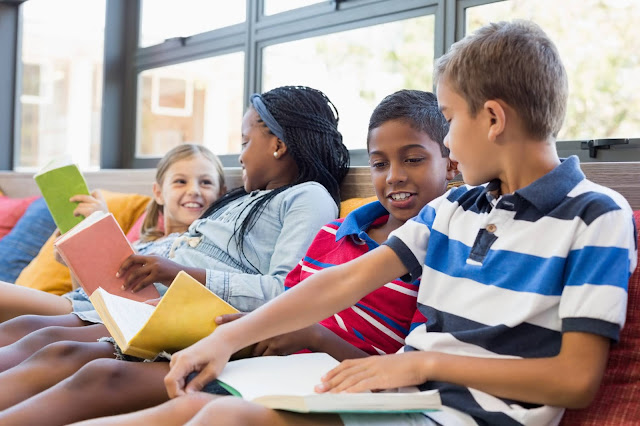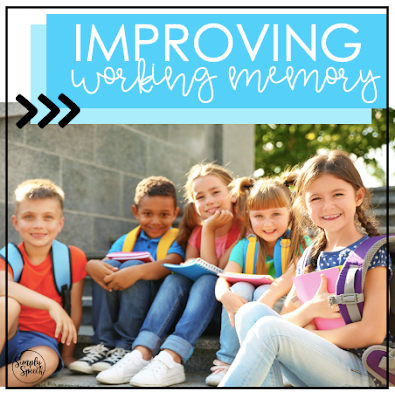Do you ever feel like you get a huge wave of kids with similar disabilities at the same time? Right now I have quite a few kids with working memory difficulties. In a research study published in 2016, they found that children with developmental language impairments are often reported to show difficulties with working memory. This has also been evident with auditory processing disorders. This may be the possible cause of the inability to segregate and group incoming information. If you are unfamiliar with the term 'working memory' think of 'short-term memory.' Both of these terms refer to information you temporarily hold in your memory, so that they are available when you need them. I have seen it frequently referred to as your brain's post-it note! However, working memory specifically is important for putting information that we are learning together with our current knowledge base. It helps with manipulation and transformation of visual and verbal information, such as remembering instructions and problem solving . Working memory continues to develop until the person is around 15 years old. But as we all are individuals and unique, some can hold more information than others.
Having trouble with working memory can have negative affects on our children. Children with working memory difficulties may have difficulty with concentration, following multistep directions, completing tasks, difficulty self correcting. They are easily distracted, show slow progress even when working hard, miss important details, and have trouble waiting their turn.
1. Road Trip Game: this is fun for groups. Do you remember playing "I'm going on a road trip and I am going to bring...." game we played as kids? Each person in the group verbally adds an item to bring on the road trip (or to a party, the beach, a picnic, etc) but also has to remember what the others before them wanted to bring... in order! The next person in line repeats what the others before him/her said they would bring and add on his own. For example, Child 1: "I'm going on a road trip and I am going to bring apples." Child 2: "I'm going on a road trip and I am going to bring apples and cookies."
2. Missing Items! Bring out a tray of items. Give the child a few minutes to look at the items and try to memorize what was on the tray. Have the child close his/her eyes or turn away from the tray. Remove an item (or a few) from the try and see if the child can figure out what is missing by visiting their memory of what they previously saw. You can also simply cover the tray with a towel and see if the child can recall all the items that were on the tray.
3. Memory (often called Concentration) This simple card game is great for working memory skills. Pick out pairs of cards, mix them up, and place them face down on a table. Have the students take turns flipping over two cards at a time to see if they have a match. Keep the cards in the same place so you can work on remembering where they were. Pro tip: Kill two birds with one stone by using matching articulation cards if your student is also working on that skill!
4. Card Games! If your child likes to play cards, there are tons of great working memory games you can try, like Go Fish or Old Maid. My family is a huge UNO fan. Not only do we have to remember the rules and which cards we are holding while playing, but they also what cards our opponent is holding, too. Cards are also easy to keep in your bag and play with your children while you have some down time. Play card games while at a restaurant waiting on your food or while waiting on big brother to finish soccer practice!
5. Simon! Simon is a fun electronic strategy game. To beat Simon, you have to recall a pattern of colors and repeat it back in the correct order by pressing the colored buttons. The longer you play, the more complicated the patterns become! Bop It! Would also be a great option for listening to verbal directions and executing them quickly. I like to have these games readily available for car trips!
6. Student Teacher! When your child/student is learning a new skill, have them teach it back to you. Have them explain the process, it will help them process the information as they say it out loud.
7. Operation: Recall. Operation Recall is a TpT activity I created years ago for one student specifically struggling with this skill.
A few other suggestions for kids that need extra help with working memory....
- Make it Multisensory! Multisensory strategies engages more than one sense at a time. It can help kids keep information in mind long enough to use it. Let your students see, touch, and move while learning a new skill. Use graphic organizers and allow students to take notes.
- Chunk information into smaller bites.
- Make sure your child is free of distractions and able to listen to your directions. Have them repeat it back to you.
- Find ways to connect information. This can help your child with long-term memory as well as working memory.
Research article mentioned above: https://journals.sagepub.com/doi/abs/10.1177/0265659016655378
Did you find this post inspiring? Every share, pin, comment and like helps!


